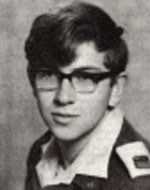Avraham, son of Rachel and Shevach, was born on 28.11.1951 in Rehovot. He spent his childhood in his parents’ farm in Nir Galim, where he studied at the elementary school in Kibbutz Yavneh and at the agricultural school of the religious kibbutz in Yavneh. In school he liked geography and history, as well as agricultural subjects connected with the Land of Israel, and nature, he did well in his studies. From his childhood Avraham was attracted to work in the agricultural farm. In elementary school, his heart did not go after school. He loved the farm and was most drawn after the barn, where his father worked. Every holiday and every opportunity, Avraham would work there. Avraham was drafted into the IDF in early December 1969 and served in a combat unit in the Nahal Brigade. However, he aspired to serve in the Armored Corps, requested a transfer and was transferred to the Artillery Corps, where he served in a moving artillery unit. He underwent basic training and a squadron commander’s course, after which he took a paratroop course as part of the Nahal Brigade and completed his career as an outstanding trainee. After completing a course for artillery officers he was appointed the commander of a field battery in a mobile artillery battalion. At the end of his regular service, he continued his career, which he saw as his future. He maintained close ties with his family and the agriculture. During vacations, after arduous training and lengthy exercises, he would come to his home telling his parents about his experiences in the army, discussing his future with his friends, and even finding time to work in the farm. Abraham’s parents raised him on Torah, labor, and love of the homeland according to tradition, and he set up plans to establish a Jewish-religious home in Israel. Avraham was an outstanding soldier, an excellent instructor and a responsible and dedicated officer. In his unit, he became known as an artillery expert and served as a model for his students and fellow officers. Although he was a meticulous commander in training and always aspired to the highest level of performance, he was loved by his battery. His commanders testified that his battery usually reached the highest achievements thanks to his professional knowledge, his control of his men and their personnel, and the loyalty of the soldiers to their commander. Abraham was honest, yet uncompromising in matters of army, discipline, and professionalism. Thus he managed to develop the pride of the unit in the battery to peaks that were the glory and the model. He managed to turn the battery into a second home for his soldiers. In the Yom Kippur War, Abraham was commander of a mobile artillery battery that fought in the northern Golan Heights and served as an artillery liaison officer for his batteryg. During the war, all his efforts were concentrated on one paramount task – to assist the armored forces with fire, and this he did while advancing the moving cannons under his command as close as possible to the auxiliary forces. He himself was in the combat zone, from where he could range the cannons for their purposes. His commanders recounted how Avraham ran between the commanders and the commanders on the ground, asking for one thing – goals. With a compass and a map, exposed to the enemy’s fire, it is right at every moment to make measurements aim, mark targets and fire cannon fire. During the assault on Mazra’at Beit Jan on October 12, 1973, Avraham was hit and killed by the bombing of Syrian planes on his embankment and brought to eternal rest in the Nir Galim cemetery. Survived by his parents, brother, and sister. Was promoted to the rank of captain on October 6, 1973, and was awarded a commendation by the chief of staff, in which Lieutenant General Mordechai Gur described Avraham’s fight: “Throughout the fighting, he was the first tanks of the battalion and showed courage and resourcefulness. With great devotion, he tried to organize artillery batteries into the battalion and jumped out of the tank under heavy artillery fire to measure precise azimuths and targets on the ground. In his actions, he showed courage, coolness, and devotion. “Meshko, Nir Galim, published a booklet in his memory, which included the words of the family members, teachers, friends and commanders about his character. Rio and his commanders helped his parents build a stone monument on his farm, which was brought from the place of Abraham’s death.
